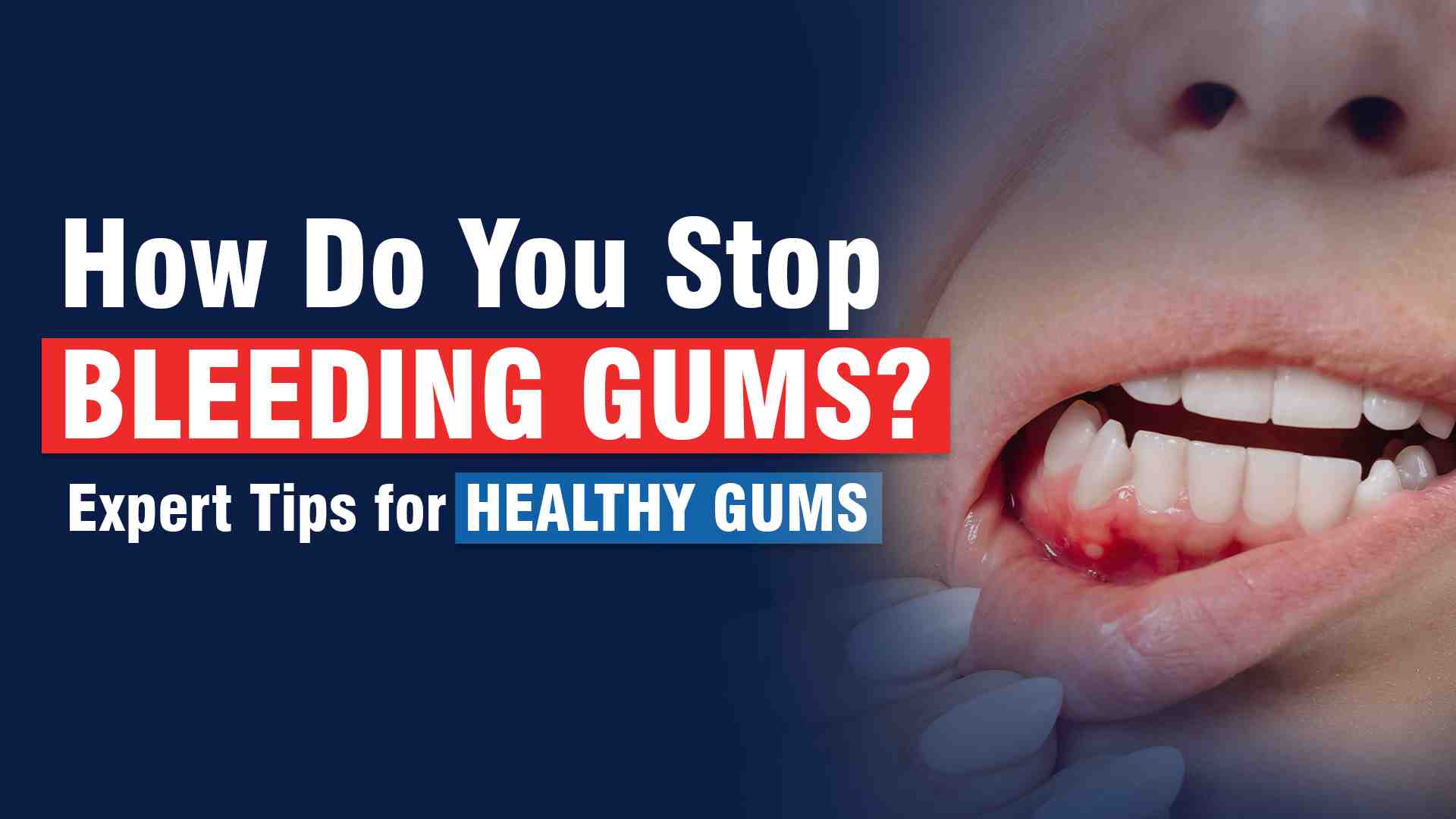How Do You Stop Bleeding Gums? Expert Tips for Healthy Gums
Verified By Dr. Lokesh Bahadur Singh | 03-Oct-2024
Bleeding gums can be an alarming issue, especially when you're brushing or flossing your teeth. While it might seem like a minor problem, frequent gum bleeding can be a sign of underlying oral health issues that need to be addressed. In this article, we will discuss how to stop bleeding gums, what causes them, and effective treatment options. Dr. Lokesh Bahadur Singh, Sr. Consultant Dental Surgeon at Kailash Hospital, Dehradun, shares his expert advice on maintaining gum health and preventing bleeding gums.
Table of Content
Bleeding gums can have several causes, ranging from poor oral hygiene to more serious underlying conditions like gum disease. Before diving into how to stop bleeding gums, it’s essential to understand what might be causing them in the first place.
Dr. Lokesh Bahadur Singh explains that bleeding gums are frequently the initial indication of gum disease, referred to as gingivitis. This condition arises when plaque, a sticky layer of bacteria, accumulates on the teeth and gums. If not addressed, gingivitis can advance to a more severe type of gum disease known as periodontitis, which may result in tooth loss and various other health issues.
Also read: How to take care of Teeth with Cavities?
Here are some of the most common causes of bleeding gums:
- Gingivitis: Gingivitis, a common affliction marked by inflamed gums, is typically the culprit behind bleeding gums. This pesky condition arises when plaque and bacteria build up on teeth and gums, triggering irritation and discomfort. Unfortunately, neglecting good oral hygiene practices, such as regular brushing and flossing, can significantly worsen the situation.
- Aggressive Brushing or Flossing: While brushing and flossing are essential for maintaining healthy gums, doing so too aggressively can damage gum tissue and lead to bleeding. "It’s important to use a soft-bristled toothbrush and be gentle when cleaning your teeth," advises Dr. Singh.
- Vitamin Deficiencies: A deficit in crucial vitamins, specifically Vitamin C and Vitamin K, can have a profound impact on our oral health, often culminating in bleeding gums. The significance of these vitamins cannot be overstated, as they are essential in maintaining robust, healthy gums and preventing the onset of inflammation.
- Hormonal Changes: Women may experience bleeding gums during pregnancy, menstruation, or menopause due to hormonal fluctuations. These changes can increase gum sensitivity and make them more prone to bleeding.
- Medications: It's worth noting that certain prescription medications, including blood thinners, can increase the risk of bleeding gums. If you're currently taking any medications and have noticed that your gums are bleeding, it's a good idea to discuss this issue with your dentist to determine whether it's a potential side effect.
- Tobacco Use: The hazardous effects of tobacco use extend far beyond the lungs, with a devastating impact on oral health. Specifically, it can drastically weaken gum tissue, making it increasingly difficult for gums to recover from damage and leading to a heightened risk of gum disease, chronic bleeding, and a host of other serious issues.
- Infection: Oral infections can also cause the gums to bleed. Conditions such as viral or fungal infections can irritate the gums and make them more susceptible to bleeding.
Now that we’ve covered the potential causes of bleeding gums, let’s explore how to reduce and stop the problem. Whether you're dealing with occasional bleeding or frequent occurrences, following these steps can help improve gum health and prevent further issues.
- Maintain Proper Oral Hygiene: To prevent bleeding gums, it's crucial to prioritize good oral hygiene. This involves brushing your teeth at least twice a day, flossing daily, and using an antibacterial mouthwash to eliminate bacteria and reduce plaque buildup. According to Dr. Singh, "Regular brushing and flossing are vital in removing the bacteria and plaque that can cause gum bleeding." It's essential to brush gently with a soft-bristled toothbrush, taking special care to clean the gumline and remove any trapped debris.
- Use an Antibacterial Mouthwash: Antibacterial mouthwash can help reduce inflammation and bacteria in the mouth, which can minimize bleeding gums. Choose a mouthwash that is specifically designed for gum health and use it daily as part of your oral hygiene routine.
- Improve Your Diet: A balanced diet rich in vitamins and minerals can strengthen your gums and reduce the likelihood of bleeding. Incorporate foods that are high in Vitamin C and Vitamin K, such as citrus fruits, leafy greens, and vegetables, to promote healthy gums. According to Dr. Singh, a well-balanced diet is essential for keeping your gums in top shape. For instance, Vitamin C plays a vital role in repairing tissues, whereas Vitamin K helps facilitate blood clotting, which can greatly reduce excessive bleeding during dental procedures.
- Stop Smoking: If you smoke, giving it up is one of the smartest choices you can make for your oral health. Smoking compromises your immune system, making it more challenging for your gums to recover. Stopping smoking will help alleviate gum bleeding and lower your chances of encountering gum disease and other significant health problems.
- See a Dentist Regularly: Regular dental check-ups and professional cleanings play a vital role in preventing gum disease. If you're experiencing persistent bleeding gums, it's imperative to book an appointment with your dentist. They will thoroughly assess your oral health and recommend a personalized course of treatment to get your gums back on track. At Kailash Hospital, Dehradun, Dr. Lokesh Bahadur Singh provides comprehensive dental care, including the diagnosis and treatment of gum diseases. "If you have bleeding gums that don’t improve with at-home care, it’s important to see a dentist for a thorough evaluation," he advises.
- Use a Saltwater Rinse: To help soothe gum inflammation and promote a rapid recovery, try gargling with a warm saltwater rinse. Simply mix one teaspoon of salt into a glass of warm water, swish the solution around your mouth for approximately half a minute, and then discard it. By repeating this routine twice daily, you may find that it effectively calms inflamed gums and reduces bleeding.
- Floss Gently: While flossing is crucial for removing plaque and food particles from between the teeth, it's important to do it gently. Aggressive flossing can damage gum tissue and lead to bleeding. Use a slow, gentle motion when flossing and avoid snapping the floss into your gums.
- Switch to a Soft-Bristled Toothbrush: If you're using a hard-bristled toothbrush, it may be contributing to gum irritation and bleeding. Switching to a soft-bristled toothbrush can help reduce trauma to the gums while still effectively cleaning your teeth.
- Treat Underlying Health Conditions: If your bleeding gums are caused by an underlying health condition, such as diabetes or a blood disorder, managing the condition can help alleviate gum problems. Work with your healthcare provider to ensure that your overall health is in good shape, which will, in turn, benefit your oral health.
Also read: Understanding Chest Heaviness after Eating: Causes, Symptoms, and Solutions
If you've had no success with home remedies and bleeding gums persist, it's likely time to consult a dentist for personalized attention and guidance. At Kailash Hospital, Dehradun, Dr. Lokesh Bahadur Singh and his team specialize in treating gum diseases and other oral health issues.
"According to Dr. Singh, bleeding gums are a red flag that can indicate a more severe underlying issue, such as gum disease, which is why it's crucial to tackle the problem promptly and prevent any potential long-term consequences." The dental team at Kailash Hospital can provide comprehensive treatment plans that include deep cleaning (scaling and root planing), medications, and lifestyle recommendations to stop gum bleeding and promote healthy gums.
Bleeding gums should never be ignored, as they can indicate underlying gum disease or other health issues. By practicing good oral hygiene, eating a healthy diet, quitting smoking, and seeking professional dental care, you can stop bleeding gums and improve your overall oral health.
Dr. Lokesh Bahadur Singh, Sr. Consultant Dental Surgeon at Kailash Hospital, Dehradun, recommends regular dental checkups and prompt treatment to prevent gum problems from progressing. Whether you're dealing with occasional bleeding gums or more persistent issues, following these tips and seeking expert advice can help you maintain healthy, strong gums.
If you’re experiencing bleeding gums and need professional care, don’t hesitate to visit Kailash Hospital, Dehradun, for expert treatment and guidance.



 +91-9711918451
+91-9711918451
 international.marketing@kailashhealthcare.com
international.marketing@kailashhealthcare.com







